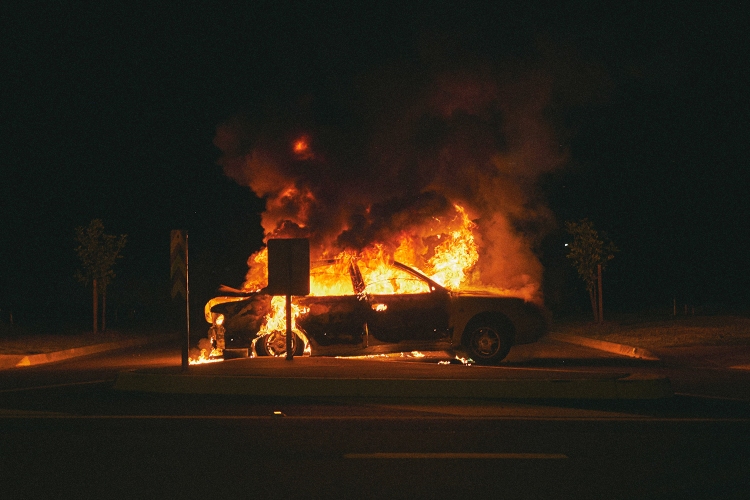Amelia Grant
Top 6 Causes of a Car Fires

A car fire is one of the most dangerous situations. The materials from which modern mass-produced cars are made don’t resist fire well so the car can completely burn out in a few minutes. The situation when a car fire has only one cause of occurrence is quite rare.
In most cases, with a deeper analysis of the incident, a group of culprits is determined. The most common of them is the human factor as well as mechanical and chemical causes. Their combination creates an incredibly dangerous situation. One aspect complements the other, thereby increasing fire losses.
In any case, if the car is already on fire, the cause is not so important. People don't think about whether the engine has overheated or whether a flammable liquid has been spilled until it comes to insurance claims. But, if you take into account the main factors that can cause a fire, disaster can be avoided. Here are six most likely fire scenarios that you should be aware of.
1. Poor maintenance
The human factor will also not serve as a direct cause of the fire, but again it will create favorable conditions for the outbreak of fire. Being lazy and setting fire to a car with gasoline and a match is not the same thing, but in the end, they can lead to the same result. Careless maintenance of the car can be an indirect cause of fire if you do not pay attention to broken parts or defects in the wires. For example, a bad engine gasket can allow a flammable liquid to leak, and frayed wires can help it ignite.
2. Design flaws
The culprit of car fire because of bad design is the manufacturer of the car. As a rule, this flaw doesn’t cause a fire by itself, but omissions in the design itself can create all the conditions for ignition. When they are identified, manufacturers withdraw their products from the market.
3. Accident
Depending on the area of damage, a car accident can cause a fire. Most cars are designed so that the metal takes the brunt of the impact, protecting important internal parts. But this protection is not always enough. With a strong impact, there is a high probability of fluid leakage, heat generation, and smoke, which together create ideal conditions for ignition. That is why even in the case when there are no visible signs of a fire, but a rather serious accident has occurred, it is necessary to leave the car as soon as possible. Only when there is no risk of fire, can you get a car to auto collision repair.
4. Engine overheating
This factor is a great example of how one problem can cause an even bigger one. The car engine is unlikely to be able to warm up to such a temperature that it can simply catch fire on its own. The most likely scenario is that overheating the engine will affect the temperature of the oil or coolant, which, under the influence of this, will be squeezed out of their circulation zones and get on hot parts, which, in turn, will most likely lead to a fire.
5. Malfunctions of the electrical system
This factor is one of the most common causes of car fires. The configuration of any battery is quite complicated. They can release explosive gas in the engine compartment, and a short in the wiring can ignite it. Electrical system hazards are not limited to the area under the hood but can cause a fire anywhere in the vehicle. That’s why it is essential to check and repair the electrical system in the car in time.
6. Fuel leak
Leaks in the fuel system are the most common cause of fires. They can arise due to external interference or by themselves, which is especially dangerous. Even worse, gasoline can catch fire from a spark even at low temperatures. At a temperature of 495 ° C, gasoline will spontaneously ignite, and this will turn into an uncontrollable process.

